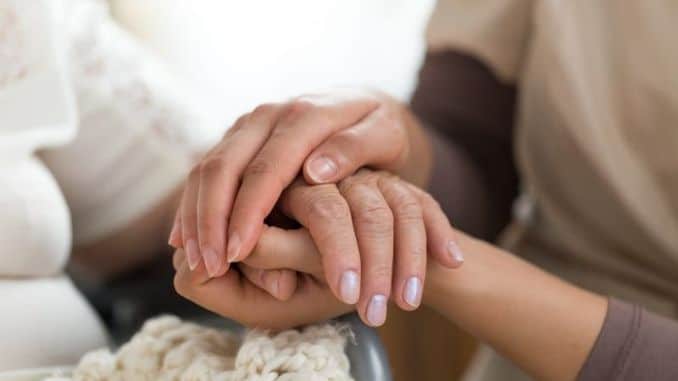
To care for someone who is dying is a labor of compassion and intense love. Providing comfort and palliative treatment for a dying loved one is among the most selfless and beautiful things you might ever do in life.
Regardless of your good heart and best intentions, caring for a dying loved one is a trying and challenging endeavor. You are not alone in this. We have created a guide to providing excellent care to your beloved during the final months of life.
Find Caregiver Support
Early on in the caregiving process, it is imperative that you find support. For some, support may be physically attending a weekly group while a friend provides respite care. For others, an online support group may be ideal. In whatever way best suits your need, find people who are in similar situations to relate with and contact when you need support. You will need people through this time. Caring for a dying loved one is profoundly complex. It will require every bit of stamina you have and more. You’ll need a strong support system to keep your head above water.
Consider In-home Hospice Care
If you’ve decided to care for your terminally ill loved one at home, instead of at a hospice facility, you can still opt for professional assistance. In-home hospice care is a very good option.
One caregiver, whose mother was receiving in-home hospice care, said, “Mom’s sickness has caused her temper to become nasty, but the nurses and the aids who bathe her never complain. The hospice chaplain comes to visit Mom weekly. He brings his guitar and sings songs and prays with her. He calls me after his visits to let me know that he’s there for our family as well.”
With in-home hospice, which is normally financially covered by Medicare and most medical insurance, you will receive professional advice and services to attend to your loved one at home. Generally, when your loved one’s doctor has determined that he or she has less than six months of life left, in-home hospice services are recommended. According to Omni Care Hospice in Las Vegas, “The earlier the transition to [in-home hospice care], the more effective it is to control symptoms and provide peace and quality of life for the patient and family members.”
Most in-home hospice services include multiple weekly visits from a hospice nurse, regular visits from a hospice counselor for the patient, pain management assistance, medication administration, hygienic care for the patient, counseling services for the family and caregivers, 24-hour, on-call assistance and bereavement counseling.
Create a Comfort-care Space
If you have a main floor bedroom to set up hospice care, that’s perfect. However, if all of your bedrooms are on the second story, and you are always downstairs, you’ll need to create a place on the main floor for your loved one to be stationed.
A friend of mine, who was caring for her dying husband, created a comfort-care area in her home right next to her couch between the family room and the kitchen. His bed was there as was a nightstand with his medications and all necessary care supplies. It was an ideal spot for her. She could tend to household duties, fold laundry and cook meals all while being within a few feet of her husband. Toward the very end, she slept on the couch near him so that she could wake up easily when her alarm sounded every two hours to administer his pain medication.
As you create your comfort-care space, prioritize practicalities. Make sure you aren’t blocking traffic from room to room. Set up a bed or recliner for your loved one in an area where you spend most of your day. If it’s possible, position the furniture so that there’s a pleasant view out a window or near a beautiful painting on the wall. Also, make yourself a nice comfortable spot to rest near the patient’s bed. Bring in a table for books and necessities so that your essential items are within arm’s reach as well.
Set up barriers if pets might disturb your loved one. It may seem sweet that the dog wants to be close, but if it jumps up into the bed and causes additional pain or discomfort to the patient, that will be a problem. You’ll want to be able to control the area fully to minimize any disturbances.
Watch Your Conversation
When my friend was caring for her dying husband, she told me that she had learned that a person’s sense of hearing is often just fine as he or she is dying. She advised that if we needed to speak of anything negative, we should go to another room.
Bereavement support specialist and Methodist pastor Larry Patten echoes my friend’s admonition. He says, “ Near death, hearing is possibly our last form of active connection with the world around us.” Be aware of the words you are speaking around your loved one. If you don’t have good, kind and uplifting things to say, wait until you are well out of earshot to utter them ― if you have to speak them at all.
Say Yes to Help
It isn’t always easy to accept help from others. Learn to say yes to caring for relatives and friends who want to help. When your sister calls and asks if she can come to sit with your dying loved one for a few hours while you go out and get some fresh air, accept the help. When a friend offers to pick up your groceries or sleepover and take turns getting up to administer medications, take him or her up on the offer. Providing palliative care to someone at the end of his or her life will be one of the most heart-wrenching and exhausting things you ever do. Accept all sincere offers of help during this time graciously.
Facilitate Spiritual Advice
At the end of life, your homebound loved one may want to discuss spiritual matters. Be open to listening, regardless of your personal religious views. Bring in a clergy member to offer counsel. Nearly all pastors, priests, rabbis and bishops offer end-of-life visitation to members of the community at no charge. Be sensitive to any denominational preferences your loved one may have. A lifelong Catholic may not appreciate a Baptist minister at his or her bedside and vice versa.
Keep It Familiar
During these months of hospice care, your home may be frequented by plenty of folks unfamiliar to your loved one. He or she will likely get visits from nurses, aids, and clergy who are strangers. Do your best to limit the intrusion and balance it with those who your patient knows and loves. Invite close friends to come and visit as often as possible. Ask family members to swing by from time to time. The presence of familiar faces is comforting and calming in the final days.
Assess the Mood Often
This is a stressful, sorrowful and difficult time ― to say the least. It isn’t easy to keep the mood of your home positive and uplifting, but it is necessary. Do whatever it takes to keep peace and harmony in the home during this time. Don’t invite your dramatic Aunt Joan over if all she wants to do is talk negatively about her husband during the visit. Play soothing and uplifting music when the mood of the house seems somber. Are things getting chaotic? If so, massage your loved one’s hands with soothing oils and dim the lights. Assess the atmosphere often and maintain a calm environment at home.
Help Him or Her Say Goodbye
As your loved one is dying, he may have some messages he wants to convey to friends or family members. If there is unfinished business or words that need to be spoken, help your loved one express himself.
At the Very End
Reposition the Bed
Without control of the trunk, it is extremely difficult to find comfort. Reposition your loved one in the bed. Use cushions and pillows to keep him or her in a natural and relaxed position. Often, the best position for easier breathing is with the upper body at about a 45-degree incline. It may also help to put cushions under each arm to stabilize your loved one.
Moisten the Mouth
When he or she is no longer able to drink water, it’s important to moisten the mouth with a wet sponge or ice chips to aid in comfort.
Keep Talking
Long after your loved one has lost the ability to speak, he or she will still need you nearby. The best way you can make your loving presence known is to speak sweet words by his or her side. Once you’ve run out of things to say, read books, poetry, uplifting articles and good stories out loud in a calm voice.
Ask for Medication Adjustments
At the very end, breathing becomes more labored, and the body systems are shutting down. You may hear your loved one groan in pain. This stage could last up to a few days. Even if you’ve avoided or limited pharmaceutical intervention up to this point, the very final days and hours can be terribly painful without adequate pain management. Talk to your loved one’s medical provider about increased pain medication.
You will never regret giving your loved one comfort and peace through the last days of his or her life. “Spending moments with another in earnest presence is one of the simple ways we can show unconditional love. It is the memories created from these impressions that survive after all else passes.” ― Molly Friedenfeld
Eating well during a hard time will help you stay healthy and enable you to show up for the people who need you. For the best foods to heal you body, check out The Best Foods that Rapidly Slim & Heal in 7 Days, here!






